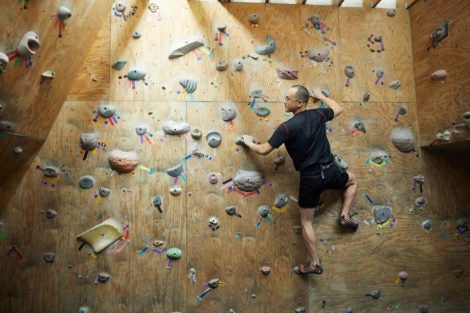February 26, 2020—Attorney and physician Glen Cheng is now earning his MPH as part of Harvard T.H. Chan School of Public Health’s Occupational & Environmental Medicine Residency program. He recently discussed his path to Harvard Chan School, the importance of occupational health, and how board games and rock climbing help him unwind.
I’ve always been interested in the biological sciences as well as theory and philosophy. As an undergraduate at The College of New Jersey, I majored in biology and minored in philosophy. And when I found out about the joint MD/JD program at Rutgers University, I was really attracted to the idea. I saw it as a way to keep working through philosophical and theoretical problems while pursuing medicine.
After the program, I focused on legal training and work experience, clerking for two federal judges, working in law firms as a patent attorney with a focus on the pharmaceutical industry, and serving as a regulatory counsel at the Food and Drug Administration’s Center for Drug Evaluation and Research (FDA/CDER). Each of these enjoyable experiences taught me diverse skills and informed my perspective on innovation in medicine.
I’m currently in the Occupational & Environmental Medicine Residency program at Harvard Chan School. As part of the residency, I’m required to earn my MPH degree to better understand population health and the health of workforces. The residency is a two-year program. The first year is focused on working toward my MPH degree, and I rotate half-a-day a week in clinic. The second year of the residency is focused on being in the clinic and working with patients. During that year, I’ll go through four main rotation blocks at nearby hospitals. I’m also working part-time at a bioinformatics startup in Cambridge called nference, which is an exciting place to work because we are doing cutting edge informatics research.
I’ve really enjoyed my classes in biostatistics, epidemiology and clinical informatics. They’ve allowed me to work with large population-level data sets to assess safety and effectiveness of medical interventions, and that’s something new to me that’s not necessarily covered in medical school. Medicine has now reached the point where we can build effective clinical support tools that harness the incredible amount of information in the scientific literature and medical records to improve patient care; but this also needs to be done on a population level while respecting individual patient privacy.
One aspect of occupational health that interests me is understanding how emerging technologies affect the workforce. Whether it’s nanotechnology or new medical devices that are potential sources of radiation exposure for health care workers, we need to carefully study these technologies so we can accurately characterize the risk they pose and craft appropriate regulations to protect workers’ health.
Something that stands out about Harvard Chan School is how students collaborate with one another and work together. The breadth of experience and diversity of backgrounds of my classmates is so impressive. I’m strong on law and medicine but still learning statistics, while some of my classmates are the opposite—they have really strong backgrounds and experience in statistics but are still learning on the clinical side. It’s great because it allows us to work together and learn from each other.
The professors here are truly world experts, and I’m really fortunate to be working closely with Stefanos Kales and David Christiani. They’re helping me understand the science and epidemiology of occupational health and how to manage the clinical aspects of the program. But, importantly, they’re working with me to figure out what’s next in my career and the best path forward.
I feel really fortunate to have received financial aid support though a Carson Family Scholarship and The Prajna Fellowship. The generosity of these programs means so much to me as a resident physician.
One book I think everyone should read is “Dune” by Frank Herbert, a low-technology science fiction novel set in a desert world of scarce resources but strong-willed, memorable characters.
The last thing I watched on Nextflix was “The Expanse.” It’s a fantastic sci-fi series that has an epic scope and explores all types of political, ethical, and technological issues through these different planets and climates.
One of the best ways to unwind after a stressful day or week is spending some time at the rock climbing wall on campus here in Harvard Medical School’s Vanderbilt Hall. There’s a great community of climbers here who’ve helped me learn the ropes, so to speak. I also really enjoy board gaming, and Cambridge has a couple of great board gaming spots. Pandemonium Books and Games in Central Square is one of my favorites.
After I finish at Harvard Chan, I’m hoping to use my background in intellectual property, FDA regulations, and population health to help bring new medical innovations to people with unmet medical needs.
photo: Kent Dayton
